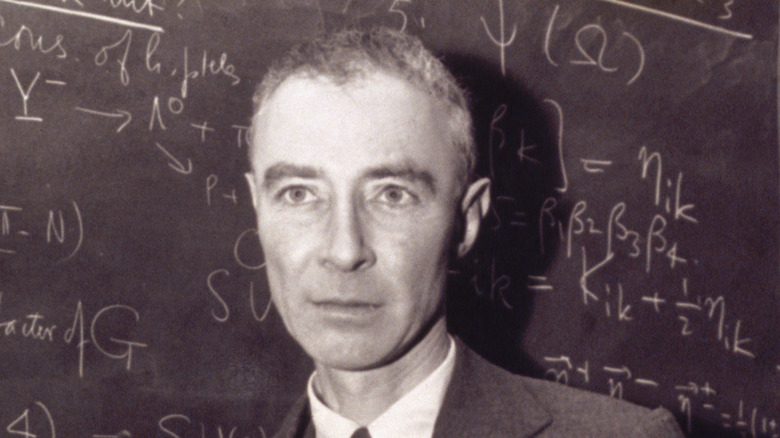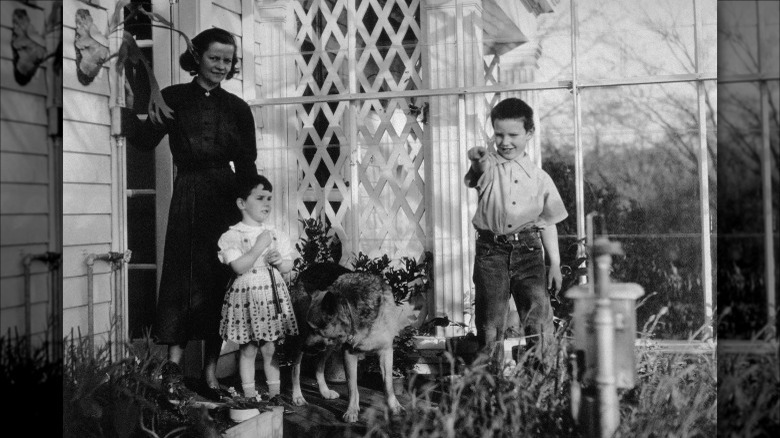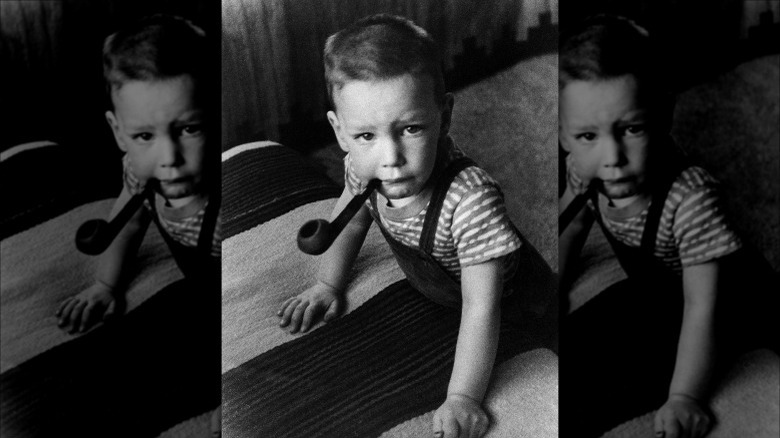What We Know About J. Robert Oppenheimer's Real-Life Family
This articles references addiction, depression, and suicide
Christopher Nolan's biopic "Oppenheimer" renewed interest in J. Robert Oppenheimer, the theoretical physicist credited with designing the first atomic bomb. However, Oppenheimer has fascinated American culture since his Manhattan Project days not only because nuclear weapons reshaped history overnight but also because he led a fascinating life. Nolan delves into Oppenheimer's drama-filled marriage to Katherine "Kitty" Puening, a German-born botanist and passionate member of the Communist Party.
In this case, fiction isn't too far from reality. When she met Oppenheimer in 1939, Puening was still married to her third husband, British doctor Richard Harrison. That didn't stop them from having an affair that they made no effort to hide. When Puening fell pregnant, she called Harrison, and they agreed to divorce. Oppenheimer and Puening wed in 1940, but that wasn't the end of the troubles. In addition to a couple of Oppenheimer's supposed extramarital affairs with old girlfriend Jean Tatlock and friend's wife Ruth Tolman, their parenthood journey was similarly complicated.
Not long after welcoming Peter in 1941, Oppenheimer and Puening left him in the care of his friend Haakon Chevalier and his wife, getting him back months later when they moved to New Mexico. After their daughter Katherine, known as Toni, was born in 1944, they also left her in the care of friend Pat Sherr, with Oppenheimer even asking if she wanted to adopt her. She didn't. After their complicated childhood, Peter and Toni went on to live secluded lives.
Peter retreated to a ranch and Toni to the Caribbean
The Oppenheimer household was not the most child-friendly place. Kitty Puening — who struggled with alcoholism and depression — did nothing to hide her dislike for her son, Peter. Her relationship with her daughter was better — at least in Toni's younger years. "She wanted only good and happiness for Toni. She really was just intolerable with Peter," J. Robert Oppenheimer's secretary Verna Hobson said in a 1979 interview with historian Martin J. Sherwin.
However, Toni found it increasingly difficult to deal with Kitty's addiction, and their relationship took a turn in her adolescence. "Toni and her mother were at each other's throats all the time," a friend described, according to the Atomic Heritage Foundation. Peter, who was never a good student, left home after high school and worked as a carpenter. After J. Robert's 1967 death, he retreated to his father's New Mexico ranch, where he has stayed out of the public eye.
"You'd come into the Oppenheimer kitchen, and Peter would be a shadow ... trying not to be noticed," Bob Serber said in the book "American Prometheus." Toni also opted for seclusion. In 1969, her application for a United Nations translator job was rejected because of her father's revoked security clearance 15 years earlier. Toni then moved to her family's old home in the Virgin Islands and, in 1977, died by suicide.
If you or anyone you know is having suicidal thoughts, please call the National Suicide Prevention Lifeline by dialing 988 or by calling 1-800-273-TALK (8255).
J. Robert Oppenheimer's grandchildren liked Christopher Nolan's depiction
While Toni Oppenheimer had no children, Peter Oppenheimer (seen above) made J. Robert Oppenheimer and Kitty Puening grandparents of three — though they never got to meet. Peter's eldest, Dorothy Vanderford, was born in 1973 and Charles Oppenheimer in 1975. Little is known about the third, but Vanderford and Charles seem close and often discuss their grandparents together.
Luckily, neither had many issues with Christopher Nolan's rendition of their family history in "Oppenheimer," in which Cillian Murphy played the role of J. Robert. Charles expected to dislike it, but he ended up being positively surprised. "I often have that reaction to biographies and pundits when they talk about my grandfather. I feel like they're missing something. And sometimes it really feels personal," he told Time in July 2023. Nolan had warned him beforehand that he had to take poetic license with some facts and flat-out change part of the narrative to make the story fit his artistic vision.
Charles thinks that helped. "That's probably led into my acceptance of the movie," he said. Charles was impressed, describing it as largely on point despite some dramatization, pleased that his grandfather wasn't another real person Hollywood misportrayed. Dorothy had a bit more issue with some of Nolan's liberties, but she also enjoyed the film. "I overall feel positive about it. There were a few things that I didn't agree with and didn't like, but overall, I felt like it was a good movie," she told KSNV NBC Las Vegas.



